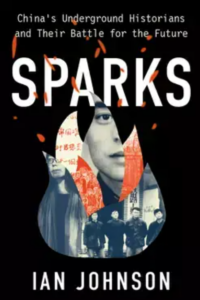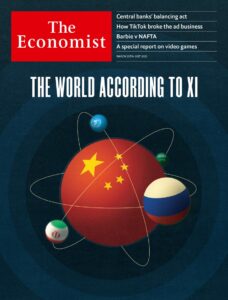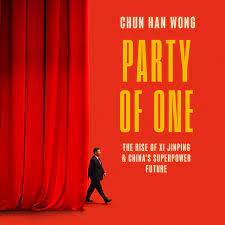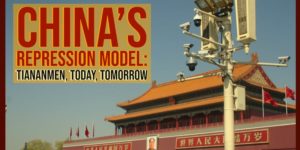 A “growing number of Chinese see the Party’s monopoly of the past as the root of their country’s current authoritarian malaise,” according to a new book by Ian Johnson, a Pulitzer Prize-winning author and the Stephen A. Schwarzman senior fellow for China studies at the Council on Foreign Relations (CFR).
A “growing number of Chinese see the Party’s monopoly of the past as the root of their country’s current authoritarian malaise,” according to a new book by Ian Johnson, a Pulitzer Prize-winning author and the Stephen A. Schwarzman senior fellow for China studies at the Council on Foreign Relations (CFR).
Johnson draws parallels to the Soviet era samizdat movement where dissidents circulated clandestine publications and helped undermine authoritarian rule in the Cold War, CFR reports. He describes a nationwide movement of counter-historians in China—university professors, independent filmmakers, underground magazine publishers, novelists, artists, and journalists—who “seek to correct the Party’s misrepresentation of the past and change their country’s slide toward ever-stronger authoritarian control.”
“Despite overwhelming odds, people inside China today still publish works and make films that challenge authority. Their ideas still spread, and when problems in society reach a boiling point, they are often looked to for ways of thinking about their country,” Ian Johnson writes in his new book, Sparks: China’s Underground Historians and their Battle for the Future. “The fact is that independent thought lives in China. It has not been crushed.”
 “Since taking power in 2012, Xi Jinping has made control of history a top domestic priority. He has closed scores of unauthorized journals and museums and jailed those who oppose his version of the truth,” Johnson explains. “For modern Chinese leaders, history legitimizes their hold on power: history chose the Communist Party to save China; history has determined that it has succeeded; and history blesses its continued hold on power.”
“Since taking power in 2012, Xi Jinping has made control of history a top domestic priority. He has closed scores of unauthorized journals and museums and jailed those who oppose his version of the truth,” Johnson explains. “For modern Chinese leaders, history legitimizes their hold on power: history chose the Communist Party to save China; history has determined that it has succeeded; and history blesses its continued hold on power.”
If political conformity was imposed in the imperial past by instilling Confucian orthodoxy and official history, vast areas of China always remained beyond the control of the central government, adds analyst Ian Buruma. There also existed something we would call civil society: religious institutions—Buddhist, Taoist, and, later, Christian, too—as well as clan associations and other independent social networks, he writes for The New Yorker:
Many rebellions against China’s official rulers came from millenarian groups and religious cults that sprang up among the oppressed. Government based on moral orthodoxy can perhaps only be challenged by alternative orthodoxies, hence the ferocity of the Communist government’s crackdown on such movements as Falun Gong. It may look like a relatively harmless cult of elderly Buddhist-inspired meditators. But to Party ideologues Falun Gong represents a direct and dangerous challenge to their ideological monopoly, and thus to the legitimacy of Communist rule.
 At the start of one of her articles, [underground historian] Jiang Xue quoted the philosopher Hannah Arendt on the relevance of the people she profiles — and her own life, Johnson writes for The Times:
At the start of one of her articles, [underground historian] Jiang Xue quoted the philosopher Hannah Arendt on the relevance of the people she profiles — and her own life, Johnson writes for The Times:
“Even in the darkest of times we have the right to expect some illumination, and that such illumination may well come less from theories and concepts than from the uncertain, flickering, and often weak light that some men and women, in their lives and their works, will kindle under almost all circumstances and shed over the time span that was given them on earth — this conviction is the inarticulate background against which these profiles were drawn. Eyes so used to darkness as ours will hardly be able to tell whether their light was the light of a candle or that of the blazing sun.”
Arendt’s quote is especially apt because it is open-ended. It doesn’t imply that people working for change in dark times are bound to win because good always trumps evil, or some other cliché. But the implication is clear: In dark times, light is precious; it always matters. RTWT
 Under Xi’s leadership, China has further restricted and suppressed civil society, religious groups, human rights defenders, speech, the press, and academic discourse. The party-state has closed much of the space that had previously existed for limited social activism, according to a recent report from the Congressional Research Service (CRS), which adds:
Under Xi’s leadership, China has further restricted and suppressed civil society, religious groups, human rights defenders, speech, the press, and academic discourse. The party-state has closed much of the space that had previously existed for limited social activism, according to a recent report from the Congressional Research Service (CRS), which adds:
Since 2001, congressional appropriations have funded efforts to promote human rights, democracy, the rule of law, civil society, and internet freedom in China, as well as programs to promote sustainable development, environmental conservation, and preservation of indigenous culture in Tibetan areas. These include programs administered by relevant agencies as well as by the National Endowment for Democracy (NED), a nongovernmental foundation funded primarily by congressional appropriations.

National Endowment for Democracy
Civil society groups, including the International Federation for Human Rights and the World Organisation Against Torture (OMCT) within the framework of the Observatory for the Protection of Human Rights Defenders, expressed deep concern about the conditions of detention and called for the immediate, unconditional release of journalist and #Metoo activist Sophia Huang Xueqin and labor activist Wang Jianbing, after two years of arbitrary detention.
Rights advocates say Huang and Wang are unlikely to receive a fair trial in a judicial system controlled by the party with a conviction rate above 99.9%, CNN reports.
“We don’t know for sure what the substance of the Chinese government’s case against Huang Xueqin and Wang Jianbing is, but we can be certain that the process will be a complete sham,” said William Nee, a research and advocacy coordinator at Chinese Human Rights Defenders.
“Huang has not seen a lawyer of her choice in two years of detention. They were both reportedly subjected to prolonged interrogations and police frequently would wake Huang up in the middle of the night and start interrogations,” Nee told CNN.







